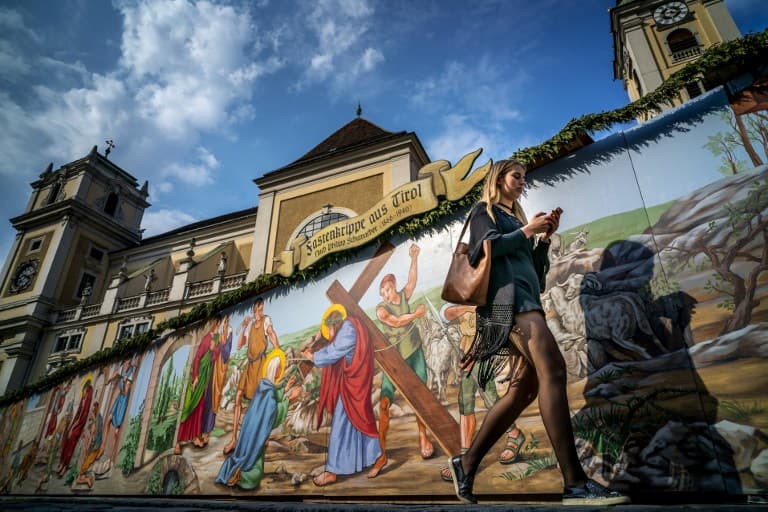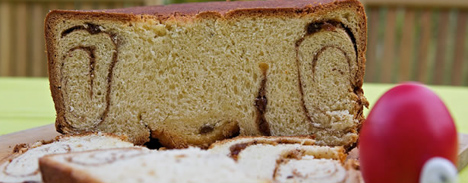How to celebrate Easter in Austria

With Easter just around the corner, The Local looks at how the holiday is celebrated across the traditionally Catholic country, where it tends to be a religious rather than commercial occasion.
Palm Sunday (April 2nd) heralded the start of Holy Week (Karwoche). Traditionally, Catholics make large bouquets from willow twigs and foliage, which are decorated with ribbons and apples, are taken to church and blessed to commemorate the arrival of Jesus in Jerusalem.
These are called Palmbuschen, and are later placed in fields to protect the crops, or sometimes outside homes to protect families from thunderstorms and disease.
In some parts of Austria Easter fires are lit during the night before Easter Sunday. In a tradition dating back to pagan times people meet around the fire to sing and dance - and the more agile even jump over the fire (but don’t try this one at home).
On Easter Sunday the 40 days of fasting for Lent officially come to an end. This is an excellent excuse to tuck into a traditional Easter brunch with sweet bread (Osterpinze), cold cuts, coloured eggs and horseradish.
For those with children, the mythological Easter bunny traditionally hides colourful Easter eggs, sweets and small presents around the house, or if it’s warm enough, in the garden. Children are also given a delicious cake in the form of a lamb (Osterlamm), traditionally by their godfather or godmother.
Easter eggs are a big deal in Austria and there are usually two kinds - the decorative ones and the chocolate ones that you eat. The decorative ones are real eggs which have been carefully blown beforehand so they are a hollow shell. After being painted and decorated they are hung in windows, on plants and on bunches of willow twigs.
A popular way to decorate eggs is to use ferns and small flowers which are attached to the egg before it is coloured or stained, and then removed to leave a pattern. In some parts of Austria a game is played where the eggs are knocked together (Eierpecken), an Easter version of conkers.

Reindling, traditional cake from Carinthia. Photo: austria.info
Austria isn't just famous for its Christmas markets, it also has plenty of wonderful Easter markets, where you can stock up on regional goodies and enjoy live music.
Vienna’s main Easter markets are at Schönbrunn Palace and at Freyung. The Freyung market also features craft workshops for children.
If you are in Vienna over Easter, a musical highlight is the OsterKlang series of concerts and operas at the Theater an der Wien.
The Franziskanerplatz Easter Market in Graz, Styria, is the place to go for regional meat, schnapps and cheese specialities. For crafts and traditional gift items, head to the Easter Handicraft Market on Hauptplatz.
Salzburg’s Easter Festival begins every year on the Saturday before Palm Sunday with an opera premiere and ends on Easter Monday when the opera is traditionally performed a second time.
Salzburg’s traditional Easter Market is held at the Open Air Museum. This is the place to try out egg decorating, tying Palmbuschen bouquets, and for filling your Easter basket with ham, eggs, bacon, butter, cheese, sausages, honey, and home-made bread and candles. All products come from local farms and are sold directly by the farmers.
Klagenfurt’s Easter Market is held on the Neuer Platz, in front of the town hall. Browse dozens of stalls selling Easter goods, and enjoy live music and readings.
Villach Easter Market features a colourful mix of souvenirs and gift items. In addition to traditional Easter handicrafts such as decorative candles, you can also buy Carinthian farm products like ham and sausages and the traditional Reindling Easter cake.
Tyrol's Easter festival features religious compositions, dance performances and chamber music at various venues across the province, including the Innsbruck Congress Centre.
Hall Easter Market has 25 stalls offering Easter baskets, candles and eggs as well as regional delicacies, organic produce and Easter chocolate. A petting zoo with rabbits and lambs is sure to be a hit with young visitors, who can also make their own gifts at craft booths.
Kufstein’s central park will be transformed into a culinary-themed Easter market.
Innsbruck Easter Market features arts, authentic crafts, traditional music and food in the midst of the Old Town right in front of the iconic Golden Roof.
Comments
See Also
Palm Sunday (April 2nd) heralded the start of Holy Week (Karwoche). Traditionally, Catholics make large bouquets from willow twigs and foliage, which are decorated with ribbons and apples, are taken to church and blessed to commemorate the arrival of Jesus in Jerusalem.
These are called Palmbuschen, and are later placed in fields to protect the crops, or sometimes outside homes to protect families from thunderstorms and disease.
In some parts of Austria Easter fires are lit during the night before Easter Sunday. In a tradition dating back to pagan times people meet around the fire to sing and dance - and the more agile even jump over the fire (but don’t try this one at home).
On Easter Sunday the 40 days of fasting for Lent officially come to an end. This is an excellent excuse to tuck into a traditional Easter brunch with sweet bread (Osterpinze), cold cuts, coloured eggs and horseradish.
For those with children, the mythological Easter bunny traditionally hides colourful Easter eggs, sweets and small presents around the house, or if it’s warm enough, in the garden. Children are also given a delicious cake in the form of a lamb (Osterlamm), traditionally by their godfather or godmother.
Easter eggs are a big deal in Austria and there are usually two kinds - the decorative ones and the chocolate ones that you eat. The decorative ones are real eggs which have been carefully blown beforehand so they are a hollow shell. After being painted and decorated they are hung in windows, on plants and on bunches of willow twigs.
A popular way to decorate eggs is to use ferns and small flowers which are attached to the egg before it is coloured or stained, and then removed to leave a pattern. In some parts of Austria a game is played where the eggs are knocked together (Eierpecken), an Easter version of conkers.

Reindling, traditional cake from Carinthia. Photo: austria.info
Austria isn't just famous for its Christmas markets, it also has plenty of wonderful Easter markets, where you can stock up on regional goodies and enjoy live music.
Vienna’s main Easter markets are at Schönbrunn Palace and at Freyung. The Freyung market also features craft workshops for children.
If you are in Vienna over Easter, a musical highlight is the OsterKlang series of concerts and operas at the Theater an der Wien.
The Franziskanerplatz Easter Market in Graz, Styria, is the place to go for regional meat, schnapps and cheese specialities. For crafts and traditional gift items, head to the Easter Handicraft Market on Hauptplatz.
Salzburg’s Easter Festival begins every year on the Saturday before Palm Sunday with an opera premiere and ends on Easter Monday when the opera is traditionally performed a second time.
Salzburg’s traditional Easter Market is held at the Open Air Museum. This is the place to try out egg decorating, tying Palmbuschen bouquets, and for filling your Easter basket with ham, eggs, bacon, butter, cheese, sausages, honey, and home-made bread and candles. All products come from local farms and are sold directly by the farmers.
Klagenfurt’s Easter Market is held on the Neuer Platz, in front of the town hall. Browse dozens of stalls selling Easter goods, and enjoy live music and readings.
Villach Easter Market features a colourful mix of souvenirs and gift items. In addition to traditional Easter handicrafts such as decorative candles, you can also buy Carinthian farm products like ham and sausages and the traditional Reindling Easter cake.
Tyrol's Easter festival features religious compositions, dance performances and chamber music at various venues across the province, including the Innsbruck Congress Centre.
Hall Easter Market has 25 stalls offering Easter baskets, candles and eggs as well as regional delicacies, organic produce and Easter chocolate. A petting zoo with rabbits and lambs is sure to be a hit with young visitors, who can also make their own gifts at craft booths.
Kufstein’s central park will be transformed into a culinary-themed Easter market.
Innsbruck Easter Market features arts, authentic crafts, traditional music and food in the midst of the Old Town right in front of the iconic Golden Roof.
Join the conversation in our comments section below. Share your own views and experience and if you have a question or suggestion for our journalists then email us at [email protected].
Please keep comments civil, constructive and on topic – and make sure to read our terms of use before getting involved.
Please log in here to leave a comment.